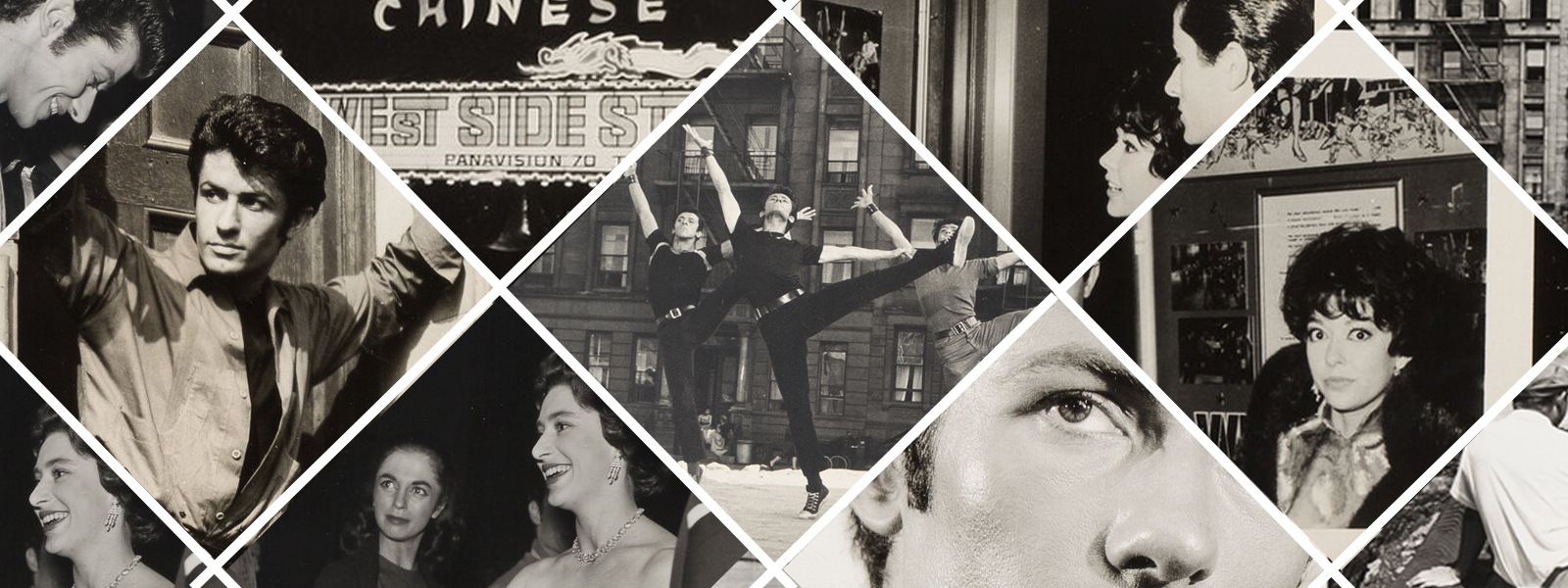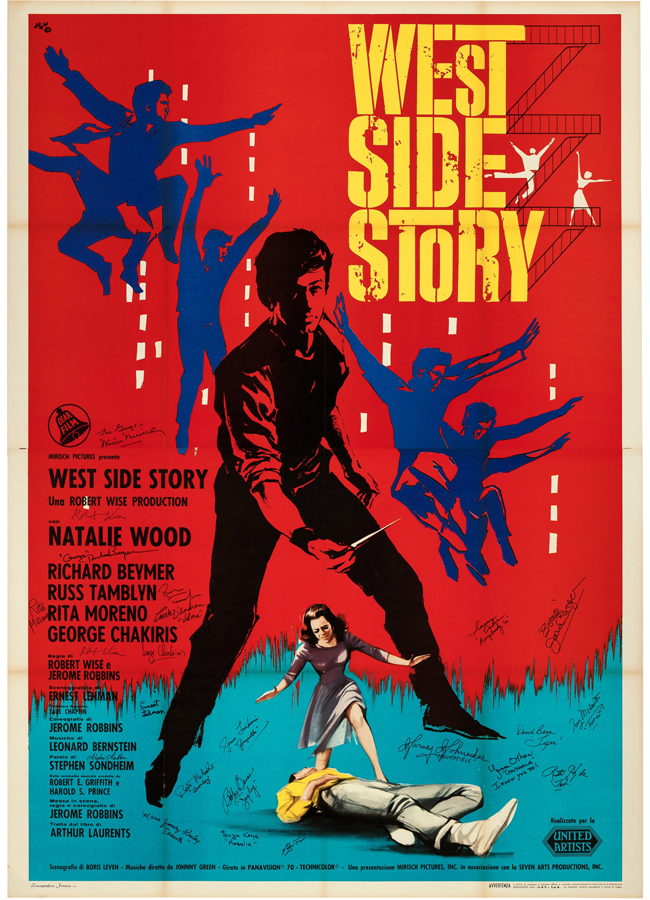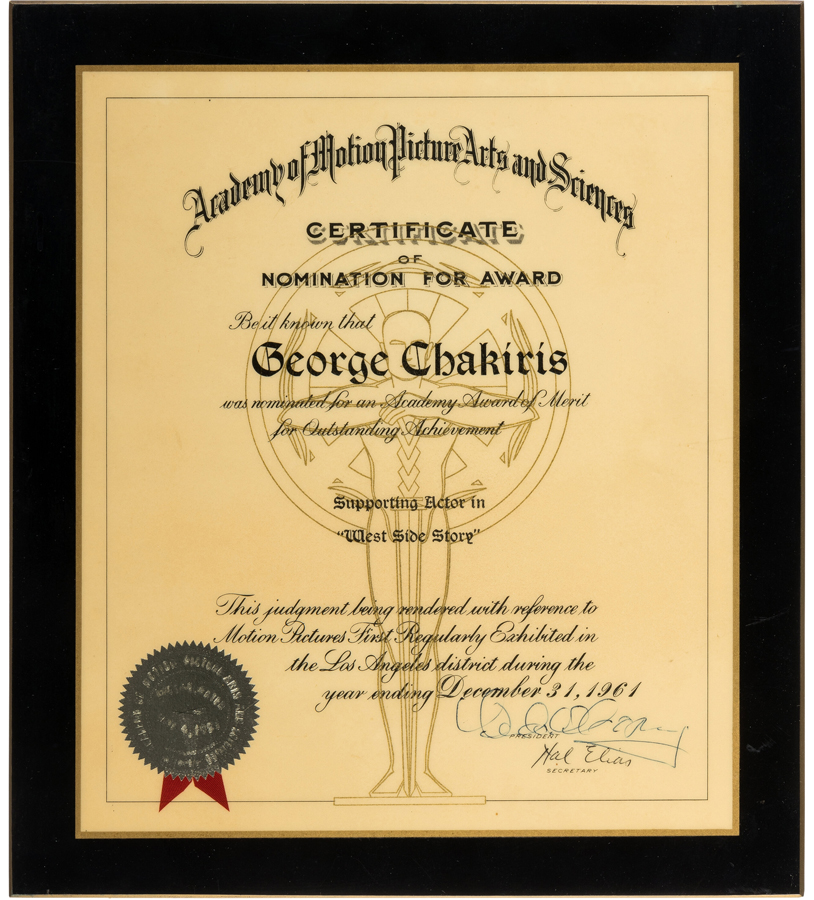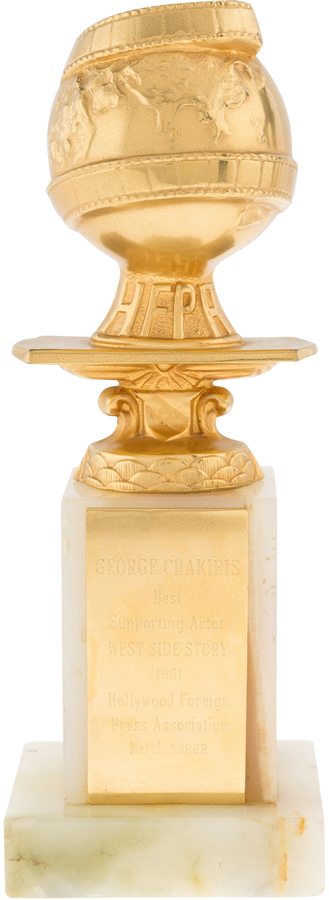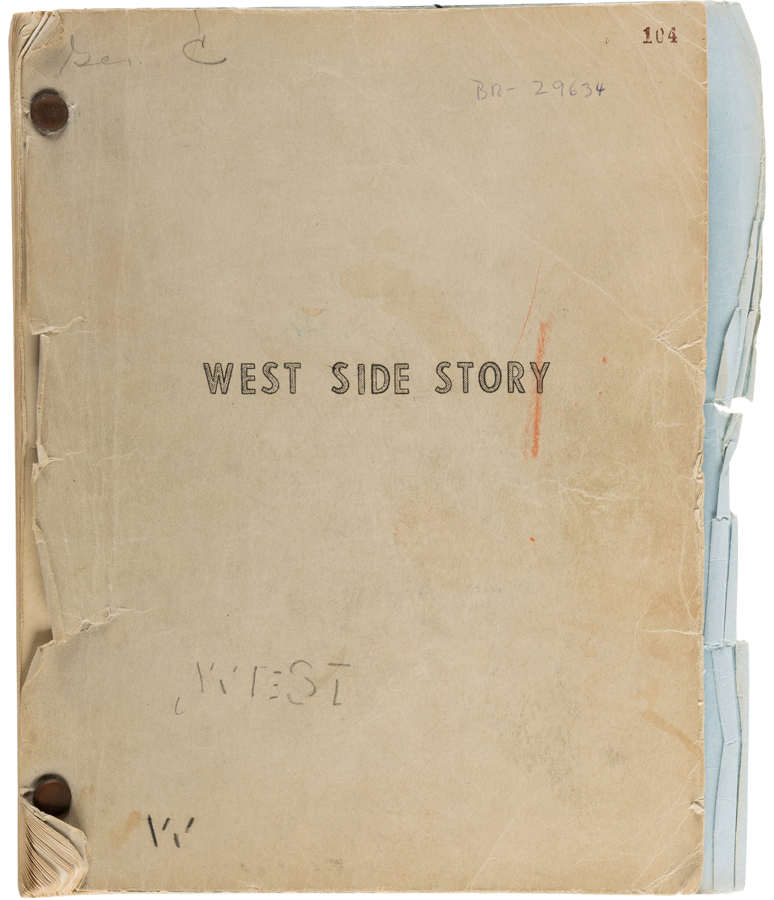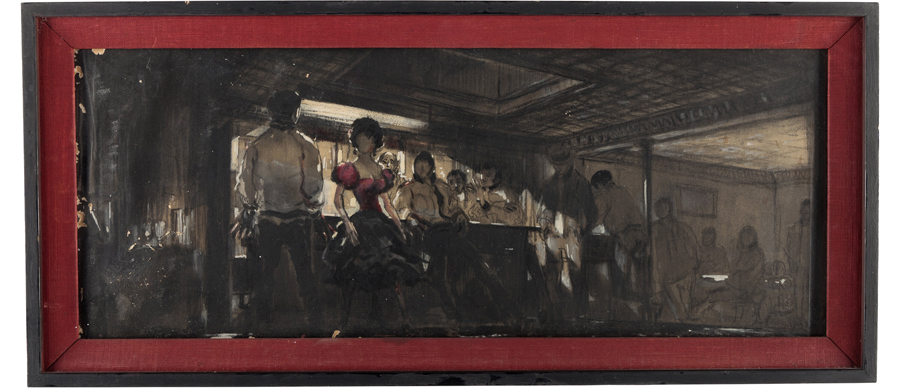THE ACTOR REFLECTS ON HIS LIFE IN SHOW BUSINESS AND TALKS PRIZED MEMORABILIA FROM THE FILM THAT CHANGED HIS CAREER
By Robert Wilonsky
George Chakiris’ initial turn in the spotlight lasted only a few seconds, if you could even find the 15-year-old.
He made his big-screen debut in 1947, credited only as “Choir Boy” in Song of Love, a Metro-Goldwyn-Mayer production starring Katharine Hepburn as 19th-century German pianist and composer Clara Schumann. So it went for nearly a decade: a long list of blink-and-you-miss-it moments in such films as Gentlemen Prefer Blondes and How to Marry a Millionaire alongside Marilyn Monroe, Brigadoon, White Christmas – usually as a dancer or chorus boy, constantly in the background, almost always uncredited. There’s no business like show business. (He was in that movie, too, somewhere.)
This Italian poster for ‘West Side Story’ comes from the collection of George Chakiris and is signed by Chakiris, Rita Moreno and other cast members of the 1961 movie musical.
“I just dreamed of being in the movies,” Chakiris says now. “I had no idea how to do that. How would you even get that? But the desire was strong. And it was deepened by that time with the choir at Metro. … It was tremendous fun, a thrill to be there, to see Marilyn on the other side of the scene, just to be around those people. It was thrilling.”
Never more so than when he was cast as Bernardo, leader of the Sharks, in Jerome Robbins and Robert Wise’s 1961 film adaptation of the Broadway smash West Side Story – for which Chakiris, blending into the background not so many years earlier, won the Academy Award as Best Supporting Actor.
This summer, Heritage Auctions is honored to present more than two dozen pieces from The Collection of George Chakiris during the July 25-26 Hollywood/Entertainment Signature® Auction, among them some of his most treasured West Side Story memories.
HOLLYWOOD/ENTERTAINMENT SIGNATURE® AUCTION 7361
July 25-26, 2024
Online: HA.com/7361
INQUIRIES
Joe Maddalena
214.409.1511
JMaddalena@HA.com
For the first time, Chakiris offers the public the opportunity to own the plaque sent by the Academy of Motion Picture Arts and Sciences when he was Oscar-nominated for West Side Story. Chakiris, who bested Jackie Gleason, Peter Falk, George C. Scott and Montgomery Clift, famously gave one of the shortest speeches in Academy Awards history: “I don’t think I’ll try and talk too much. I just want to say thank you very, very much. Thank you.”
“The thing I remember is the afterparty,” Chakiris says, laughing.
This auction also contains the Golden Globe trophy he received on March 5, 1962, as the Best Supporting Actor of 1961, alongside other trophies and honors collected throughout his long, storied career.
The Academy of Motion Picture Arts and Sciences nomination plaque for Supporting Actor presented to Chakiris for ‘West Side Story’
Here, too, is his script from West Side Story – in which he didn’t scribble a single note, as he’d memorized the entire thing long before landing the job. As Chakiris points out in his handwritten note on the screenplay’s title page, he knew every line because he’d already spent a year and a half on a London stage – playing Riff, leader of the rival Jets, portrayed in the film by Russ Tamblyn.
“When I did Riff for a year and a half, I was watching Ken Le Roy as Bernardo,” Chakiris says, referring to the actor who’d also played Bernardo in the original Broadway production. “It was osmosis: You’re not trying to remember everything, but you can’t help it.”
Bernardo was as grand, immortal, thrilling and tragic a role as any young actor could wish for – that moment when a kid becomes the world’s biggest song-and-dance man and turns the spotlight into a sunrise. Chakiris and Rita Moreno, who played his girlfriend, Anita, each won Oscars and Golden Globes for their performances, which included their thrilling version of “America” that wasn’t in the original stage production, in which Chita Rivera’s Anita had the song to herself. Chakiris and Moreno have remained dear friends since sharing accolades and awards.
Chakiris’ Best Supporting Actor Golden Globe trophy
In September 1961, Variety raved that the film’s “most colorful performance, perhaps, is offered by George Chakiris, leader of the Puerto Rican gang, the Sharks, and brother of femme lead” played by Natalie Wood as Maria. A month later, Bosley Crowther wrote in The New York Times, “George Chakiris is proud and heroic.” In 2004, when reviewing the two-disc home-video restoration, Roger Ebert counted among the “great things” in the film the “powerful performances by Rita Moreno and George Chakiris.”
Upon being nominated for that Oscar, Chakiris says, “I didn’t think of it in terms of career advancement or anything. None of it ever crossed my mind. I just knew it was a nice happening. I appreciated it, but I didn’t appreciate it as fully as I could have had I been more aware and smarter at the time.”
This auction contains perhaps the most iconic item from West Side Story: the leather wristband worn by Bernardo and his fellow Sharks throughout the film, which had been absent from the stage productions.
Chakiris’ original 126-page script for ‘West Side Story’
As Chakiris tells it, during rehearsals for the London production, Jerome Robbins kept the actors playing the Sharks and Jets separated: “He told us he didn’t want us to socialize with each other, on or offstage.” He also asked the cast members to get the book The Shook-Up Generation, Pulitzer Prize winner Harrison Salisbury’s 1958 treatise on juvenile delinquency and teenage gangs.
When it came time to film the big-screen version, actor Andre Tayir showed up one day wearing an archer’s wristband, which he’d bought at a sporting goods store. His fellow Sharks were so enamored of the strap that costume designer Irene Sharaff – another Oscar winner for West Side Story – purchased enough for the entire gang. Chakiris says they just felt “fantastic,” this extra bit of tough-guy business further separating the Sharks from their fair-haired nemeses vying for control of the Upper West Side.
As Chakiris once explained, “We all felt we’d put one over on the Jets.”
Set design artwork by Boris Leven for ‘West Side Story’
To the actor, though, the most meaningful piece of this auction is something seldom seen by the public: set design artwork painted by Boris Leven, winner of the Best Art Direction-Set Decoration (Color) Academy Award for his work on the film. The piece depicts what would become the turning point in the film, when Anita goes to Doc’s Drugstore to see Tony and is instead harassed by the Jets – called awful names, tossed around, almost assaulted – until she’s rescued at the last moment by the store’s namesake proprietor. Chakiris has had it since the film wrapped and kept it close until now.
“When we finished working on the film, Robert Wise had a number of those in his office,” Chakiris says. “He said, ‘Come in, take the one you want.’ So I took that one, as it is a scene that I particularly like – the scene with Rita and the guys in the drugstore, where they attack her. I love having something from the film that involved his [Leven’s] gift, his talent. He was amazing. There were so many amazing people.”
Chief among them was a kid named George Chakiris, whose extraordinary collection of Hollywood treasures leaps across the auction block this month.
 ROBERT WILONSKY is a staff writer at Intelligent Collector.
ROBERT WILONSKY is a staff writer at Intelligent Collector.

